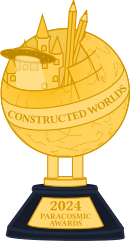Main Page
|
|
|
Information and Assistance
Wiki Administration: Andy Irons (sysop) · Centrist16 (bureaucrat) · Fizzyflapjack (technician) · S.mustafaamir (sysop) · T0oxi22 (sysop) · WorldMaker18 (sysop)
| ||||||||||
|
Conworlding, also called worldbuilding, is the process of constructing an imaginary world, sometimes associated with a whole fictional universe. The resulting world may be called a constructed world or a conworld. The term "worldbuilding" was popularized at science fiction writers' workshops in the 1970s. Developing an imaginary setting with coherent qualities such as a history, geography, and ecology is a key task for many science fiction or fantasy writers. Worldbuilding often involves the creation of maps, a backstory, and people for the world. Constructed worlds can enrich the backstory and history of fictional works, and it is not uncommon for authors to revise their constructed worlds while completing its associated work. Constructed worlds can be created for personal amusement and mental exercise, or for specific creative endeavors such as novels, video games, or role-playing games. (read more) From English Wikipedia. |
|
Paracosmic AwardsCongratulations to the winners of the 2024 Paracosmic Awards
And thank you to everyone who nominated and voted!  The inaugural 2024 Paracosmic Awards recognized the outstanding editors, projects, and content on the Constructed Worlds Wiki. Nominations and voting took place in January and February 2024. The 2024 Paracosmos recognized content from 2023 in addition to content from earlier years in the Lifetime Achievement categories.
Project Awards
Content Awards
Lifetime Achievements
|
|
Patron Article of the Month – Levantine Commune by Jaevibing, selected by Yuutarou The Levantine Commune was a country situated in the Middle East in the Levant region. Its territory was comprised of the former lands of the British Mandatory Palestine. As an independent confederation, the Levantine Commune consisted of 2 constituent 'communes' with relative autonomy from the federal government and the Jerusalem Special Administrative Zone, with Jerusalem being directly governed by the federal government as their seat of power. Despite this federal division of power, much of the Levantine Commune was centralised with a planned economy and the federal ability to veto laws passed by the communes. It was the first and last communist state in the Middle East with its capital and largest city being Jerusalem. On the 6th of October, 1973, Israeli nationalist politicians attempted a coup of the Levantine Commune government and of the Israeli Commune government. The coup fell apart after 3 days but the impact of the attempted coup was widespread and destabilising for the country. While the coup perpetrators had been arrested and imprisoned, many of the militias who had defected to join the coup were unaffected and thousands of coup participators were still in active service. Many within both communes began advocating for independence. The federal government attempted reform to quell the instability and called for snap elections in April 1974, but partisanship deadlocked the parliament and so the presidents of the Levantine Commune declared a state of emergency and dissolved legislatures and attempted to take full control of the country, leading to the Levantine National Schism where the Israeli and Palestinian Communes rose up and broke away from the rule of the federal government. The schism lasted for 3 months before it escalated to the 1975 Levant War which took place across the Middle East between the Levantine Commune government, Israel and Palestine. The war was inconclusive and the Levantine Commune failed to take back its lands but did occupy northern Jordan with Iraq. After the wars conclusion, the president Barnaby Har-Zahav declared the Levantine Commune's dissolution.  |








